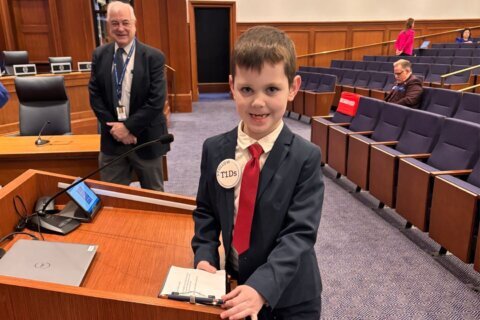A month into his term, Virginia Gov. Glenn Youngkin’s job approval is mixed, while support for his signature policy proposals is low.
Those are the findings of the annual State of the Commonwealth Poll, conducted by the Wason Center for Civic Leadership at Christopher Newport University.
Youngkin’s approval ratings, and respondents’ opinions on the direction of the commonwealth, are a muddle: 41% of respondents said they approve of the job Youngkin is doing, while 43% disapprove, and 16% said they don’t know. The differences were pretty well split among partisan lines, with 80% of Republican voters saying Virginia is heading in the right direction, compared to 22% of Democrats and 45% of independents.
“In this highly polarized environment, we see partisans running to their corners on how they view the direction of the Commonwealth and the job of the governor,” said Quentin Kidd, academic director of the Wason Center, in a statement accompanying the poll. “Youngkin’s approval numbers are certainly lower than those of recent governors in Wason Center polling early in their term.”
Youngkin does a lot better in the poll than President Joe Biden, though: Only 22% of the registered voters polled said the country was headed in the right direction, with 67% saying it’s headed in the wrong direction. That’s coupled with a 40% job approval number, with 57% saying they disapprove of the president’s performance. The Wason Center said Biden’s approval rating in Virginia was 57% a year ago. He got 54% of the vote in Virginia in 2020.
The issues in Virginia
Youngkin’s first two executive orders – both issued on his first day in office – involved the banning of what he called “divisive” concepts, including critical race theory, in Virginia’s schools, as well as banning mask mandates by locally elected school boards. (The latter is tied up in the courts, but meanwhile the General Assembly enshrined the ban in a bill, which Youngkin signed into law last week.)
Solid majorities of Virginians in the Wason Center poll oppose both initiatives.
While critical race theory is not taught in Virginia’s K-12 schools, conservatives have seized on the term to describe teachings about race that they contend makes white children and parents uncomfortable. In the Wason Center poll, Virginia voters support “teaching how racism continues to impact American society today” by 63% (36% strongly supporting it, 27% supporting it) to 33% (18% strongly opposing, 15% opposing).
Even when questioners adopted the phrase “critical race theory,” 57% of respondents opposed banning the theory (including 36% strong opposition) versus 35% who supported doing so (21% strongly).
While Youngkin pitched the ban on face coverings in schools as a victory for parents’ rights, 56% or Virginians polled said school mask decisions should be determined by “health data and information from health experts,” rather than parents, by a margin of 56% to 41%.
Regarding vaccine mandates, the results are more mixed. Majorities support them for military members, teachers, medical providers and members of Congress, while they oppose mandates for middle school students and elementary students – the latter substantially. The numbers for high school and college students and federal and state government workers and contractors are roughly equal.
The Virginia Clean Economy Act, which requires electric companies in Virginia to produce 100% of their power from renewable resources by 2050, passed and was signed into law by Youngkin’s predecessor, Ralph Northam, in 2020. Youngkin has proposed repealing it, but two-thirds of voters surveyed support the law, and a similar number support the Regional Greenhouse Gas Initiative, a cap-and-trade program that Youngkin is also looking to end.
Abortion restrictions proposed by Youngkin’s fellow Republicans in the General Assembly also get a thumbs-down from voters surveyed, with a plurality opposing a 24-hour waiting period and solid majorities opposing an ultrasound requirement and a ban on abortions after six weeks.
Solid majorities of voters approve of Youngkin’s proposal to station a police or resource officer in every public school (70% to 25%).
About 47% of respondents support Youngkin’s proposal to repeal the 2.5% grocery tax, while 25% want a tax credit for low-income residents to offset it, and 24% say the tax should stay where it is. And about 59% say the state budget surplus should be spent on underfunded government services, while 38% say it should go back to Virginians in the form of tax cuts or rebates.
The Wason Center polled 701 registered Virginia voters between Jan. 26 and Feb. 15. The margin of error is plus or minus 4.2% at the 95% level of confidence. “This means that if 50% of respondents indicate a topline view on an issue, we can be 95% confident that the population’s view on that issue is somewhere between 54.2% and 45.8%,” the Wason Center said.
The results are weighted based on region, age, race, sex, and education “to reflect as closely as possible the demographic composition of registered voters in Virginia,” the center said.
‘Bad news’
“This survey is bad news for the new governor,” said Stephen Farnsworth, a professor of political science and international affairs and director of the Center for Leadership and Media Studies at the University of Mary Washington. “And I think a lot of that has to do with the fact that the way that he’s been governing is very much answering to the concerns of more conservative Virginians, rather than trying to reach an accommodation with Democrats on many of the issues that are out there.”
“I think it’s important to recognize that the loudest voices in Virginia politics, like in national politics, do not always represent majorities,” Farnsworth added. “There is much greater support for teaching critical race theory and for taking a cautious approach on COVID among Virginians as a whole than there are if you’re listening to the loudest voices at school board meetings.”
“Running for office is very different than governing,” Farnsworth added, and for a political newcomer such as Youngkin, the difference between the public and private sectors can require a learning curve too: “I think everyone recognizes after the fact that’s a pretty big difference, even though voters like to imagine that a businessman is going to be good at government.”
Farnsworth added that the numbers for Biden were a bad sign as well. “I think that one of the things that comes out of the fact that we’ve now entered the third year of the pandemic, is that a lot of voters are pretty angry about a lot of things. And that’s going to basically impact incumbents wherever they might be.”
‘These polls were wrong’
Youngkin’s spokesperson, Macaulay Porter, said in a statement, “These polls were wrong during the campaign and are wrong now. Virginians endorsed Gov. Youngkin’s grocery tax plan so overwhelmingly that outgoing Gov. Northam included it in his budget proposal. Governor Youngkin’s initiatives have received bipartisan support and he looks forward to delivering on more promises that he made during the campaign.”








